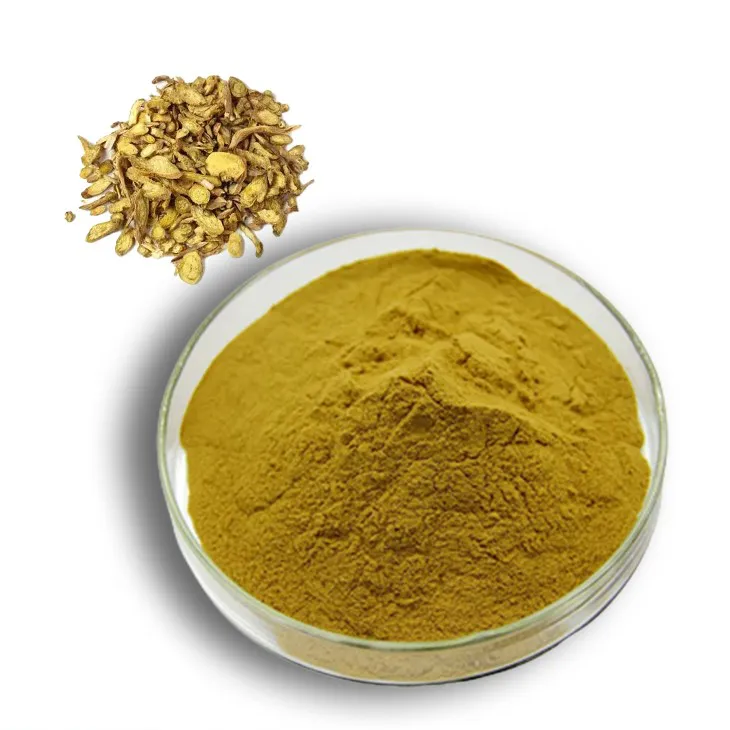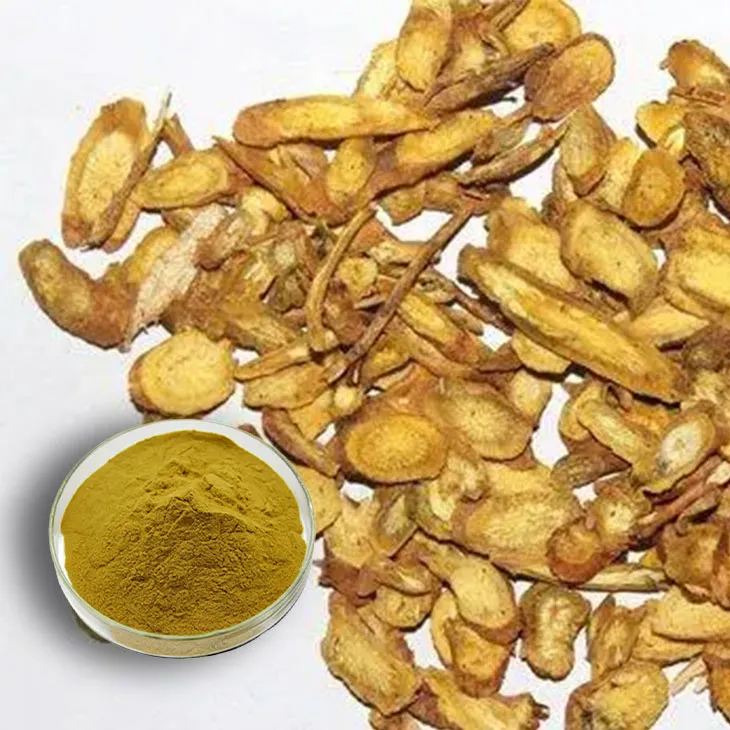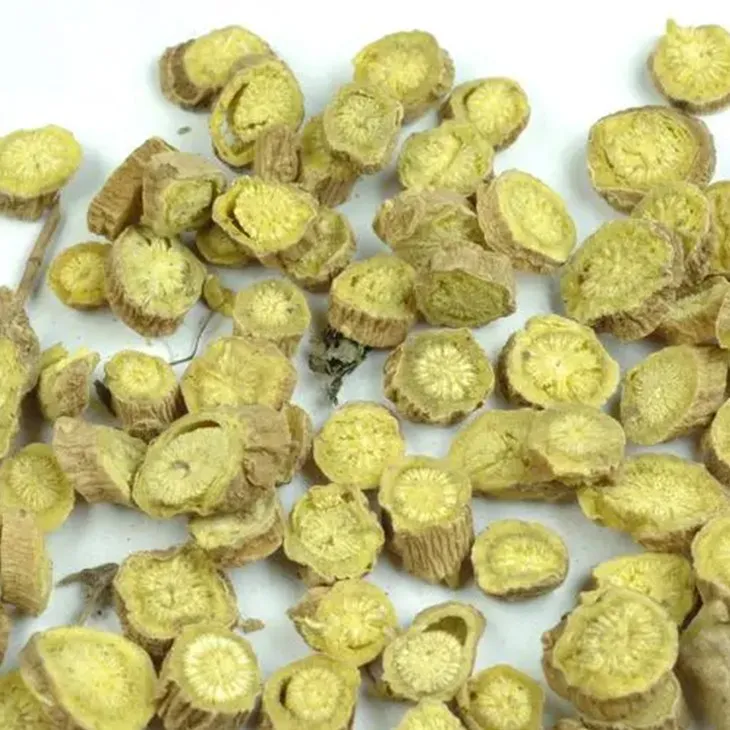- 0086-571-85302990
- sales@greenskybio.com
10 Kinds of Baicalin Beneficial to Health Improvement.
2024-12-13

1. Introduction to Baicalin
Baicalin is a flavonoid compound that has been garnering increasing attention in the field of health and medicine. It is derived from the roots of Scutellaria baicalensis, a plant with a long history of use in traditional medicine, particularly in Asian cultures. Baicalin has a complex chemical structure that endows it with a wide range of biological activities, making it a potentially valuable component for promoting health and treating various diseases.

2. Immune - Modulating Effects
2.1. Activation of Immune Cells
- Baicalin has been shown to enhance the activity of macrophages. Macrophages are the first line of defense in the immune system, and when activated by baicalin, they can better engulf and destroy pathogens. For example, in in - vitro studies, baicalin - treated macrophages exhibited increased phagocytic activity towards bacteria and viruses.
- It also plays a role in the activation of T - lymphocytes. These cells are crucial for the adaptive immune response. Baicalin can stimulate the proliferation and differentiation of T - cells, which in turn can lead to a more effective immune response against specific antigens.
- Cytokines are small proteins that play a significant role in cell - to - cell communication in the immune system. Baicalin can regulate the production of cytokines such as interleukin - 6 (IL - 6) and interferon - gamma (IFN - γ). By modulating cytokine levels, it can help to balance the immune response, preventing excessive inflammation or immune suppression.
- In some cases, baicalin has been found to decrease the production of pro - inflammatory cytokines during an overactive immune response. This anti - inflammatory property can be beneficial in autoimmune diseases where the immune system attacks the body's own tissues.

3. Potential Anti - Cancer Properties
3.1. Inhibition of Cancer Cell Proliferation
- Several studies have indicated that baicalin can inhibit the growth of cancer cells. For instance, in cancer cell lines such as breast cancer cells and lung cancer cells, baicalin has been shown to arrest the cell cycle at different stages, preventing the cells from dividing uncontrollably. This is achieved through its interaction with various cell cycle - related proteins.
- It also interferes with the signaling pathways that are crucial for cancer cell survival and proliferation. For example, baicalin can block the activation of the epidermal growth factor receptor (EGFR) pathway, which is often overactive in many types of cancer cells.
- Apoptosis, or programmed cell death, is a natural process that is disrupted in cancer cells. Baicalin has been demonstrated to induce apoptosis in cancer cells. It can activate the apoptotic machinery within the cells by upregulating pro - apoptotic proteins and downregulating anti - apoptotic proteins.
- Studies have shown that baicalin can cause changes in the mitochondrial membrane potential in cancer cells, leading to the release of cytochrome c, which is an important step in the apoptotic process. However, it should be noted that while these in - vitro and pre - clinical studies are promising, more research is needed to fully understand its potential as an anti - cancer agent in humans.

4. Cardiovascular Health Benefits
4.1. Blood Pressure Regulation
- Baicalin has been shown to have an impact on blood pressure regulation. It can act on the vascular smooth muscle cells, causing them to relax. This relaxation leads to vasodilation, which in turn reduces blood pressure. In animal models, baicalin - treated animals showed a decrease in systolic and diastolic blood pressure.
- It also modulates the renin - angiotensin - aldosterone system (RAAS), which is a key regulator of blood pressure. By interfering with the RAAS, baicalin can prevent the over - activation of this system that often leads to hypertension.
- Research has suggested that baicalin can help in reducing cholesterol levels. It can inhibit the absorption of dietary cholesterol in the intestines. By doing so, it can decrease the amount of cholesterol that enters the bloodstream and is ultimately deposited in the arteries.
- Baicalin also has an impact on the metabolism of cholesterol within the body. It can enhance the activity of enzymes involved in cholesterol breakdown and excretion, such as cholesterol 7 - alpha - hydroxylase. This helps in maintaining a healthy lipid profile and reducing the risk of cardiovascular diseases.

5. Anti - Inflammatory Actions
5.1. Inhibition of Inflammatory Mediators
- Baicalin can inhibit the production of inflammatory mediators such as prostaglandins and leukotrienes. These mediators are involved in the inflammatory process and can cause pain, swelling, and redness. By suppressing their production, baicalin can effectively reduce inflammation at the site of injury or in inflammatory diseases.
- It also targets the enzymes involved in the synthesis of these inflammatory mediators. For example, baicalin can inhibit cyclooxygenase - 2 (COX - 2), an enzyme that is upregulated during inflammation and is responsible for the production of prostaglandins.
- Baicalin can modulate several inflammatory signaling pathways, such as the nuclear factor - kappa B (NF - κB) pathway. The NF - κB pathway is a major regulator of inflammation - related genes. Baicalin can prevent the activation of NF - κB, thereby reducing the expression of genes encoding inflammatory mediators.
- Another pathway that baicalin can influence is the mitogen - activated protein kinase (MAPK) pathway. By acting on this pathway, it can further dampen the inflammatory response, providing relief in conditions such as arthritis and inflammatory bowel disease.
6. Neuroprotective Effects
6.1. Protection Against Oxidative Stress in the Brain
- The brain is highly susceptible to oxidative stress due to its high metabolic rate and high content of polyunsaturated fatty acids. Baicalin has antioxidant properties that can protect the brain from oxidative damage. It can scavenge free radicals such as superoxide anions and hydroxyl radicals, which are generated during normal brain metabolism but can cause damage if not neutralized.
- In neurodegenerative diseases such as Alzheimer's and Parkinson's, oxidative stress is a major contributing factor. Baicalin may play a role in preventing or slowing down the progression of these diseases by reducing oxidative stress in the brain.
- Similar to its actions in other parts of the body, baicalin can also exert anti - inflammatory effects in the nervous system. Inflammation in the brain can lead to various neurological disorders. Baicalin can reduce neuroinflammation by inhibiting the production of inflammatory mediators and modulating inflammatory signaling pathways, as mentioned earlier.
- It may also have a role in protecting neurons from damage caused by inflammation - associated cytokines. For example, in models of brain injury, baicalin has been shown to reduce the levels of pro - inflammatory cytokines in the brain, thereby protecting neurons from cytokine - mediated toxicity.
7. Antioxidant Activity
7.1. Free Radical Scavenging
- Baicalin is a potent free - radical scavenger. It can neutralize a variety of free radicals, including reactive oxygen species (ROS) and reactive nitrogen species (RNS). These free radicals are generated during normal cellular metabolism, but excessive production can lead to oxidative damage to cells and tissues.
- By scavenging free radicals, baicalin can protect cells from damage, including DNA damage, lipid peroxidation, and protein oxidation. This antioxidant activity is important for maintaining the overall health of the body and preventing the development of various diseases, such as cancer, cardiovascular diseases, and neurodegenerative diseases.
- In addition to directly scavenging free radicals, baicalin can also enhance the activity of antioxidant enzymes in the body. These enzymes, such as superoxide dismutase (SOD), catalase (CAT), and glutathione peroxidase (GPx), play a crucial role in the body's antioxidant defense system.
- Baicalin can upregulate the expression and activity of these antioxidant enzymes, thereby increasing the body's ability to detoxify free radicals. For example, in some studies, baicalin - treated cells showed increased SOD and CAT activity, which contributed to a better antioxidant status.
8. Anti - Diabetic Effects
8.1. Regulation of Blood Glucose Levels
- Baicalin has been shown to have an impact on blood glucose regulation. It can improve insulin sensitivity in peripheral tissues such as muscle and fat. By enhancing insulin sensitivity, cells are able to more effectively take up glucose from the bloodstream, thereby reducing blood glucose levels.
- It can also stimulate the secretion of insulin from pancreatic beta - cells. In some animal models of diabetes, baicalin treatment led to an increase in insulin secretion, which helped in controlling blood glucose levels.
- Diabetes is often associated with various complications, such as diabetic nephropathy, neuropathy, and retinopathy. Baicalin may play a role in preventing these complications. For example, in diabetic nephropathy, baicalin can reduce the levels of markers of kidney damage, such as albuminuria.
- It can also protect the nerves from damage in diabetic neuropathy by reducing oxidative stress and inflammation. In diabetic retinopathy, baicalin may help in protecting the blood vessels in the retina by its anti - inflammatory and antioxidant properties.
9. Anti - Microbial Activity
9.1. Antibacterial Effects
- Baicalin has demonstrated antibacterial activity against a range of bacteria. It can inhibit the growth of both gram - positive and gram - negative bacteria. For example, it has been shown to be effective against Staphylococcus aureus, a common gram - positive pathogen, and Escherichia coli, a well - known gram - negative pathogen.
- The antibacterial mechanism of baicalin may involve interfering with the bacterial cell wall synthesis or disrupting the bacterial cell membrane. This can lead to the leakage of intracellular contents and ultimately the death of the bacteria.
- There is also evidence to suggest that baicalin has antifungal activity. It can inhibit the growth of certain fungi, such as Candida albicans. In the case of Candida albicans, baicalin may act by interfering with the fungal cell membrane or its metabolic processes.
- However, more research is needed to fully understand the antifungal mechanism of baicalin and to determine its potential as an antifungal agent in clinical settings.
10. Skin Health Benefits
10.1. Anti - Inflammatory Effects on the Skin
- Baicalin can reduce inflammation on the skin. Skin inflammation can be caused by various factors, such as allergens, irritants, or infections. Baicalin can inhibit the production of inflammatory mediators in the skin, similar to its actions in other parts of the body.
- It can be used in the treatment of skin conditions such as eczema and psoriasis, where inflammation is a major component. By reducing skin inflammation, baicalin can help to relieve symptoms such as itching, redness, and scaling.
- The skin is constantly exposed to environmental stressors such as ultraviolet (UV) radiation, which can generate free radicals and cause oxidative damage. Baicalin's antioxidant properties can protect the skin from this type of damage.
- It can also help in maintaining the integrity of the skin barrier. A healthy skin barrier is important for preventing water loss and protecting the skin from external invaders. Baicalin may contribute to the synthesis of components of the skin barrier, such as ceramides.
11. Conclusion
Baicalin has a wide range of health - promoting effects, from modulating the immune response and potentially fighting cancer to improving cardiovascular health, reducing inflammation, and protecting the nervous system, among others. However, while the pre - clinical studies are promising, more research is needed to fully understand its mechanisms of action in humans and to develop it into effective therapeutic agents. Additionally, the safety and potential side effects of baicalin in long - term use also need to be further investigated. Overall, baicalin represents a potentially valuable natural compound with great prospects for improving human health.
FAQ:
What are the main functions of baicalin in modulating the immune response?
Baicalin can enhance the body's immune response in several ways. It can stimulate the production and activity of immune cells such as lymphocytes. It also helps in regulating the release of cytokines, which are important signaling molecules in the immune system. This modulation allows the body to better recognize and respond to pathogens more effectively.
How does baicalin potentially contribute to anti - cancer activities?
Some studies suggest that baicalin may interfere with the growth and spread of cancer cells. It might act on various molecular pathways involved in cancer cell proliferation, apoptosis (programmed cell death), and angiogenesis (formation of new blood vessels that supply tumors). However, more in - depth research is required to fully understand its mechanisms and potential as an anti - cancer agent.
Can baicalin directly lower blood pressure?
There is evidence indicating that baicalin can influence blood pressure. It may act on the smooth muscles in blood vessels, causing them to relax, which in turn can lead to a reduction in blood pressure. However, the exact mechanisms are complex and may involve interactions with other physiological processes in the body.
How does baicalin affect cholesterol levels?
Baicalin has been shown to have an impact on cholesterol metabolism. It may help in reducing the levels of LDL (low - density lipoprotein), often referred to as 'bad' cholesterol, while potentially increasing the levels of HDL (high - density lipoprotein), the 'good' cholesterol. This is achieved through its influence on the liver's cholesterol - synthesizing and - transporting mechanisms.
Are there any side effects of baicalin?
While baicalin is generally considered safe, in some cases, it may cause mild side effects such as gastrointestinal discomfort, including nausea or diarrhea. However, these side effects are relatively rare and usually occur at high doses or in individuals with pre - existing sensitivities. It is always advisable to consult a healthcare professional before starting any supplement containing baicalin.
Related literature
- The Pharmacological Effects of Baicalin on Health"
- "Baicalin: A Promising Compound for Health Improvement"
- "Research Advances in Baicalin and Its Health - related Benefits"
- ▶ Hesperidin
- ▶ citrus bioflavonoids
- ▶ plant extract
- ▶ lycopene
- ▶ Diosmin
- ▶ Grape seed extract
- ▶ Sea buckthorn Juice Powder
- ▶ Beetroot powder
- ▶ Hops Extract
- ▶ Artichoke Extract
- ▶ Reishi mushroom extract
- ▶ Astaxanthin
- ▶ Green Tea Extract
- ▶ Curcumin Extract
- ▶ Horse Chestnut Extract
- ▶ Other Problems
- ▶ Boswellia Serrata Extract
- ▶ Resveratrol Extract
- ▶ Marigold Extract
- ▶ Grape Leaf Extract
- ▶ blog3
- ▶ blog4
- ▶ blog5
-
Pure 85% Tomentil Extract.
2024-12-13
-
Curcuma Longa Extract
2024-12-13
-
melatonin extract
2024-12-13
-
Sugarcane Extract
2024-12-13
-
Beetroot juice Powder
2024-12-13
-
Lily extract
2024-12-13
-
Pueraria Lobata Extract
2024-12-13
-
Tongkat Ali Extract Powder
2024-12-13
-
Acai Berry Extract
2024-12-13
-
Marigold Extract
2024-12-13
-
Citrus Aurantium Extract
2024-12-13





















